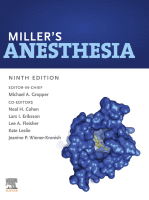Physical Address
304 North Cardinal St.
Dorchester Center, MA 02124

Key Points ▪ Sleep is a dynamic neuronal and behavioral state that can be characterized using specific electroencephalographic, electrophysiologic, and behavioral findings. ▪ Characteristics of sleep can be quantified using questionnaires, actigraphy, or respiratory polygraphy. However, polysomnography, including electroencephalogram, electrooculogram,…

Key Points ▪ Mechanisms of consciousness and memory, and their interruption by general anesthetics, are important scientific problems that have clinical relevance for the practice of anesthesiology. ▪ Consciousness is characterized by both wakefulness (i.e., the brain being aroused) and…

Key Points ▪ Deontologic (“rules-based”) ethical theory and utilitarian (outcome-based) theory clash in clinical scenarios in which the interests of individual patients are pitted against the interests of larger populations. ▪ In the United States, the predominant medical ethical principle…

Key Points ▪ Led by the discipline of anesthesiology, simulators and the use of simulation have become integral parts of many health care domains for various uses including training of novices, advanced residents, and experienced professionals; research about and with…

Key Points ▪ Excellent clinical performance is not achieved by the use of sound medical knowledge alone, as clinicians have to face multifaceted challenges not just medical issues. There is an increased awareness that human factors—both on the individual and…

Key Points ▪ Quality needs to be an integral characteristic of the system in which care is delivered. Improving the quality of care often requires reorganization of the way we work. A challenge to the anesthesia team is to combine…

Key Points ▪ Individual computers are connected via networks to share information across many users. ▪ Information security is about ensuring that the correct information is available only to the correct users at the correct time. ▪ Healthcare information storage…

Key Points ▪ The practice of anesthesiology continues to evolve with health care for patients undergoing new and, in many cases, more complicated procedures in the operating room as well as minimally invasive or interventional procedures performed in other nonoperating…

Key Points ▪ More than 5 of the world’s 7 billion people lack access to safe anesthesia and surgical services. Surgical disease accounts for 30% of global disease burden, yet less than 1% of development assistance for health supports delivery…

Key Points ▪ The scope of modern anesthesia practice includes preoperative evaluation and preparation; intraprocedural care; postoperative care including acute pain management; critical care, resuscitation, and retrieval; chronic pain management; and palliative care. Anesthesia plays a key role in health…